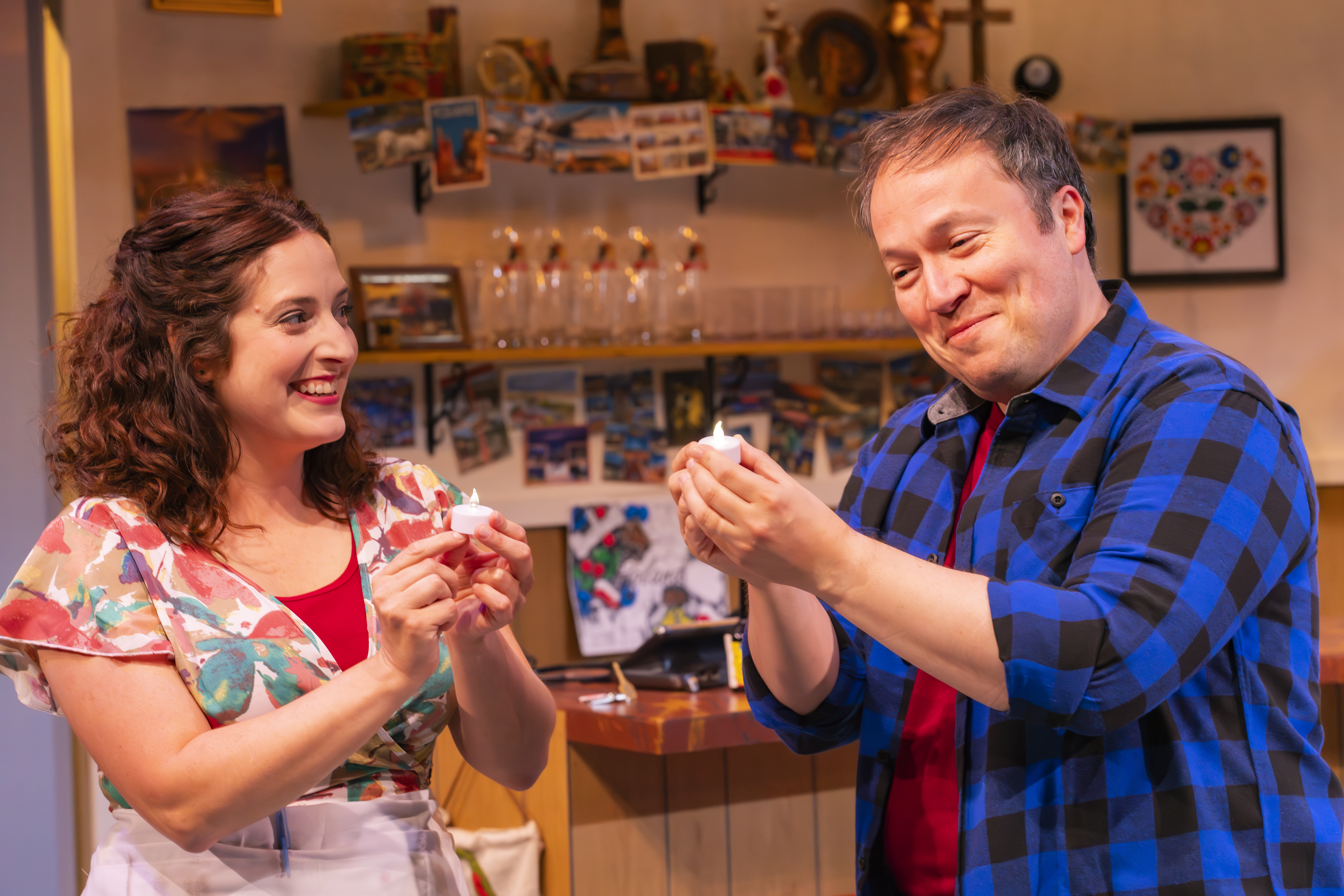“You know what I wish? Just once for my life to be like the movies.”

Lina and Mikołaj sit on the ground of the Polish diner where they both work. It’s 10pm, and Mikołaj just discovered Lina lying on the floor next to her mop. Whether she fell or decided to place herself there intentionally is up in the air, but regardless, that is where he finds her. As she proceeds to tell him about not only her challenging day, but every obstacle in her life that has led her to this dead-end moment, she lands on this wish. For a life like the movies in which the waitress gets the happy, love-story ending. Is that too much to ask?
The moment is sweet, and as the two joke around and commiserate on the highs and lows of living in Chicago on diner wages, the audience fills the room with chuckles. You may even find yourself smiling at the relatability of the moment. All Lina wants is the movie magic—the knowledge that everything will be okay, no matter how hard it might feel in the moment. If you’re anything like me, you may have found yourself wishing the same thing from time to time.

Written by Audrey Cefaly with music by Matthew M. Nielson, The Last Wide Open: a Love Song in Three Movements centers around the question of timing, and what could happen if we meet our soul mate in the right place, but wrong time. Cefaly’s play is the love story between Lina (Dara Cameron) and Mikołaj (Michael Mahler) in three separate parts/movements. Each “movement” takes place at 10pm in the Chicago diner; however, each is in a different time period. In essence, each “movement” is meant to give the couple three different chances to make the relationship take off. Movement 1 falls two years after Mikołaj moves to America, Movement 2 takes place two days after Mikołaj moves to America, and finally, Movement 3 is 15 years after the move. If the end of the movement does not offer success, Lina or Mikołaj cues a “do-over”—with the help of J.G. Smith as “Stagehand.” At times the switch is abrupt, and at others more gradual. With each transition, one or both of the actors sings a song that describes the failure, and why they deserve a do-over to get it right.
Directed by Gwendolyn Whiteside, the play is quirky and fun. Co-scenic designers Grant Sabin and Marcus Klein transform the space into a highly detailed diner, complete with a counter, register, and café tables that become the seating for the audience. Smith even passes around small appetizers at the top of the show, successfully drawing folks into the action and intimacy of the restaurant. Lighting designer Katy Viccellio and sound designer Rick Sims add to the realistic feel of the piece, especially when combined with projection design by G. "Max" Maxin IV. Each of the movements includes a rain storm, and we see this manifest through a window on the far side of the stage. As the rain starts to fall, we see droplets and a mix of blue and green light take over this area—adding a beautiful effect that heightens the mood. Other credits include: costume design by Christopher J. Neville, props design by Elyse Dolan. Production stage manager is Richard Lundy..

While much of the play showcases the high energy of the couple, you might find that the heart lives in the grounded, more emotional scenes of the show. In Movement 2, we meet a Mikołaj who struggles to speak English, having only been in America for about two days. When he meets Lina, it’s clear that he is immediately smitten. The catch? She is marrying someone else in one week, and she is busy prepping all of the final details. Yet again we find our couple in the right place, but wrong time.
In this particular scene, she decides to try on her veils for Mikołaj—asking him to share his opinion and help her pick. The first two are a little goofy, and both are quick to make this clear through a series of laughs and headshakes. However, the third invites a different mood. As Mikołaj turns around for the big reveal, he is immediately left without words. While there is a language barrier, the silence and tension between the two speaks volumes. All he can whisper is “beautiful,” and this one word feels like a thousand. With the audience sitting so close to the couple, it’s impossible not to notice the chemistry and even lean in—hoping that this might be the moment that offers the couple success.
Full of heart, Cefaly’s world premiere makes for a sweet evening full of hope. If you’re a fan of romantic comedies, this is a show you do not want to miss.
The Last Wide Open runs through August 18, and returns October 2-26 at American Blues Theater, 5627 N. Lincoln Ave. Tickets run from $25 to $65. Running time is 80 minutes, without intermission.
For more information on this and other plays, see theatreinchicago.com.
Support arts and culture journalism today. This work doesn't happen without your support. Contribute today and ensure we can continue to share the latest reviews, essays, and previews of the most anticipated arts and culture events across the city.
